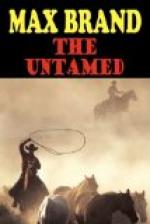The most important citizen was Lee Hardy, the Wells Fargo agent. Office jobs are hard to find in the mountain-desert, and those who hold them win respect. The owner of a swivel-chair is more lordly than the possessor of five thousand “doggies.” Lee Hardy had such a swivel-chair. Moreover, since large shipments of cash were often directed by Wells Fargo to Elkhead, Hardy’s position was really more significant than the size of the village suggested. As a crowning stamp upon his dignity he had a clerk who handled the ordinary routine of work in the front room, while Hardy set himself up in state in a little rear office whose walls were decorated by two brilliant calendars and the coloured photograph of a blond beauty advertising a toilet soap.
To this sanctuary he retreated during the heat of the day, while in the morning and evening he loitered on the small porch, chatting with passers-by. Except in the hottest part of the year he affected a soft white collar with a permanent bow tie. The leanness of his features, and his crooked neck with the prominent Adam’s apple which stirred when he spoke, suggested a Yankee ancestry, but the faded blue eyes, pathetically misted, could only be found in the mountain-desert.
One morning into the inner sanctum of this dignitary stepped a man built in rectangles, a square face, square, ponderous shoulders, and even square-tipped fingers. Into the smiling haze of Hardy’s face his own keen black eye sparkled like an electric lantern flashed into a dark room. He was dressed in the cowboy’s costume, but there was no Western languor in his make-up. Everything about him was clear cut and precise. He had a habit of clicking his teeth as he finished a sentence. In a word, when he appeared in the doorway Lee Hardy woke up, and before the stranger had spoken a dozen words the agent was leaning forward to be sure that he would not miss a syllable.
“You’re Lee Hardy, aren’t you?” said he, and his eyes gave the impression of a smile, though his lips did not stir after speaking.
“I am,” said the agent.
“Then you’re the man I want to see. If you don’t mind—”
He closed the door, pulled a chair against it, and then sat down, and folded his arms. Very obviously he meant business. Hardy switched his position in his chair, sitting a little more to the right, so that the edge of the seat would not obstruct the movement of his hand towards the holster on his right thigh.
“Well,” he said good naturedly, “I’m waitin’.”
“Good,” said the stranger, “I won’t keep you here any longer than is necessary. In the first place my name is Tex Calder.”
Hardy changed as if a slight layer of dust had been sifted over his face. He stretched out his hand.
“It’s great to see you, Calder,” he said, “of course I’ve heard about you. Everyone has. Here! I’ll send over to the saloon for some red-eye. Are you dry?”




